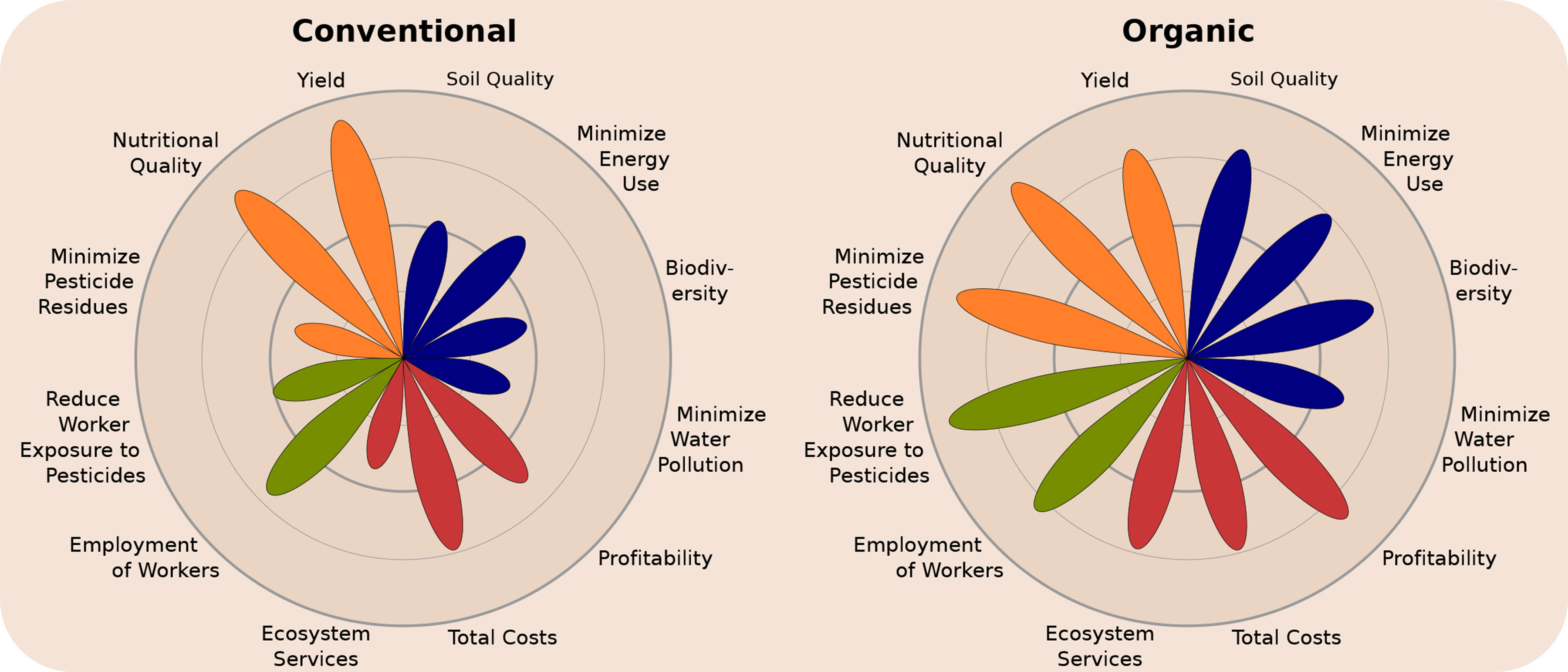11
Feb
Organic Agriculture Essential to a Sustainable Future
(Beyond Pesticides, February 4, 2016) Last week, two Washington State University (WSU) researchers published a review study in the journal Nature Plants that deemed organic agriculture as a necessary tool for feeding the global population sustainably. In their review, which analyzed hundreds of studies about organic and conventional agriculture, soil science and agroecology professor John Reganold, Ph.D., and doctoral candidate Jonathan Wachter referred to organic agriculture as an untapped resource for feeding the Earth’s population, “especially in the face of climate change and other global challenges.” Using over 40 years of science, this study, entitled “Organic Agriculture in the 21st Century,” aptly refers to organic agriculture as the solution to the globe’s current and future food crises and conventional farming as an undeniable catalyst in the Earth’s demise.

Comparison chart of ecological, environmental, and economic benefits in conventional and organic agriculture (click to see larger image)
In his blog post about the new study, Dr. Reganold explains the recent increase in agreement about the benefits and necessities of organic agriculture: “Hundreds of scientific studies now show that organic agriculture can produce sufficient yields, is profitable for farmers, protects and improves the environment, and is safer for farmworkers. Thirty years ago, there were just a couple of handfuls of studies comparing organic with conventional agriculture. In the last 15 years, the number of these kinds of studies has skyrocketed.” Using those studies, Dr. Reganold and Mr. Wachter compared organic and conventional agriculture across the four goals of sustainability identified by the National Academy of Sciences —productivity, economics, environment, and social well-being.
The study addresses critics of organic agriculture, who believe that chemical-intensive agriculture produces higher yields than organic. However, while Dr. Reganold notes that organic agriculture may produce about 10 to 20 percent less than its chemical-intensive counterpart, it thrives in environmental advantages. According to the WSU press release on the study, “Numerous studies in the review also prove the environmental benefits of organic production. Overall, organic farms tend to store more soil carbon, have better soil quality and reduce soil erosion. Organic agriculture creates less soil and water pollution and lower greenhouse gas emissions. And it’s more energy efficient because it doesn’t rely on synthetic fertilizers or pesticides.”
But the researchers argue that too much reliance is placed on the quantity of food rather than the quality and necessity. Dr. Reganold asserts that “we already produce enough food to more than feed the world’s 7.4 billion people but do not provide adequate access to all individuals.” The study also points to changing global conditions that may affect the way conventional farmers improve their yield. For example, drought is an increasing concern for farmers and conventional agriculture struggles to keep up with its organic counterpart in that sense. The study argues that because of climate change, extreme drought conditions could bode disastrous for conventional farming systems, yet feasible for organic farms because soil retention is naturally higher. “In severe drought conditions, which are expected to increaase with climate change, organic farms have the potential to produce high yields because of the higher water-holding capacity of organically farmed soils,” Dr. Reganold said. On the same note, the study points to the numerous benefits of organically-managed soil, such as carbon storage, overall quality, and reduced erosion.
One of the challenges of organic agriculture is some of the current policies governing organic farmers. The study acknowledges obstacles, such as “the costs of transitioning to organic certification, lack of access to labor and markets, and lack of appropriate infrastructure for storing and transporting food.” According to Dr. Reganold, policies should be put in place that:
- “Offer greater financial incentives for farmers to adopt conservation measures and scientifically sound sustainable, organic, and integrated crop or livestock production practices.
- Expand outreach and technical assistance that will provide farmers with better information about these transformative practices.
- Increase publicly funded research to improve and expand modern sustainable farming.”
Good organic practices work to build the soil and maintain an ecological balance that makes chemical fertilizers and synthetic pesticides unnecessary. Claims that organic agriculture cannot feed the world because of lower yields are contested by scientific studies showing that organic yields are comparable to conventional yields and require significantly lower inputs. Therefore, organic agriculture is not only necessary in order to eliminate the use of toxic chemicals, it is necessary to ensure the long-term sustainability of food production, the environment,, and the economy.
For further information, check out our webpages on Organic Agriculture.
All unattributed positions and opinions in this piece are those of Beyond Pesticides.










